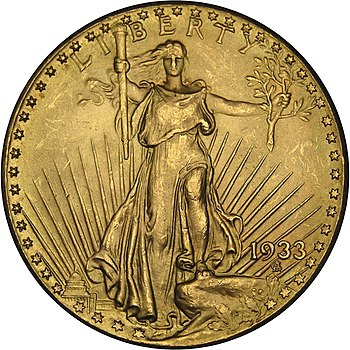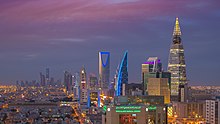The Business and Economics Portal Business is the practice of making one's living or making money by producing or buying and selling products (such as goods and services). It is also "any activity or enterprise entered into for profit." A business entity is not necessarily separate from the owner and the creditors can hold the owner liable for debts the business has acquired. The taxation system for businesses is different from that of the corporates. A business structure does not allow for corporate tax rates. The proprietor is personally taxed on all income from the business. A distinction is made in law and public offices between the term business and a company such as a corporation or cooperative. Colloquially, the terms are used interchangeably. (Full article...) Economics (/ˌɛkəˈnɒmɪks, ˌiːkə-/) is a social science that studies the production, distribution, and consumption of goods and services. Economics focuses on the behaviour and interactions of economic agents and how economies work. Microeconomics analyses what is viewed as basic elements within economies, including individual agents and markets, their interactions, and the outcomes of interactions. Individual agents may include, for example, households, firms, buyers, and sellers. Macroeconomics analyses economies as systems where production, distribution, consumption, savings, and investment expenditure interact, and factors affecting it: factors of production, such as labour, capital, land, and enterprise, inflation, economic growth, and public policies that have impact on these elements. It also seeks to analyse and describe the global economy. (Full article...) Selected articleThe economy of the Han dynasty (206 BC – 220 AD) of ancient China experienced upward and downward movements in its economic cycle, periods of economic prosperity and decline. It is normally divided into three periods: Western Han (206 BC – 9 AD), the Xin dynasty (9–23 AD), and Eastern Han (25–220 AD). The Xin regime, established by the former regent Wang Mang, formed a brief interregnum between lengthy periods of Han rule. Following the fall of Wang Mang, the Han capital was moved eastward from Chang'an to Luoyang. In consequence, historians have named the succeeding eras Western Han and Eastern Han respectively. The Han economy was defined by significant population growth, increasing urbanization, unprecedented growth of industry and trade, and government experimentation with nationalization. Another large component of the government is that it was run by influential families who had the most money. In this era, the levels of minting and circulation of coin currency grew significantly, forming the foundation of a stable monetary system. The Silk Road facilitated the establishment of trade and tributary exchanges with foreign countries across Eurasia, many of which were previously unknown to the people of ancient China. The imperial capitals of both Western Han (Chang'an) and Eastern Han (Luoyang) were among the largest cities in the world at the time, in both population and area. Here, government workshops manufactured furnishings for the palaces of the emperor and produced goods for the common people. The government oversaw the construction of roads and bridges, which facilitated official government business and encouraged commercial growth. Under Han rule, industrialists, wholesalers, and merchants—from minor shopkeepers to wealthy businessmen—could engage in a wide range of enterprises and trade in the domestic, public, and even military spheres. Selected image
Selected economyThe economy of Saudi Arabia is the second-largest in the Middle East and the seventeenth-largest in the world. The Saudi economy is highly reliant on its petroleum sector. Oil accounts on average in recent years for approximately 40% of Saudi GDP and 75% of fiscal revenue, with substantial fluctuations depending on oil prices each year. The kingdom has the second-largest proven petroleum reserves, and the fourth-largest measured natural gas reserves. Saudi Arabia is currently the largest exporter of petroleum in the world. Other major parts of the economy include refining and chemical manufacturing from the oil reserves, much of which is vertically integrated in the state-owned enterprise, Saudi Aramco. Saudi Arabia is a permanent and founding member of OPEC. In 2016, the Saudi government launched its Saudi Vision 2030 program to reduce its dependency on oil and diversify its economic resources. By 2022, Saudi Arabia had only modestly reduced its dependence on oil. (Full article...) Selected quote"Since I entered politics, I have chiefly had men's views confided to me privately. Some of the biggest men in the United States, in the field of commerce and manufacture, are afraid of somebody, are afraid of something. They know that there is a power somewhere so organized, so subtle, so watchful, so interlocked, so complete, so pervasive, that they had better not speak above their breath when they speak in condemnation of it. They know that America is not a place of which it can be said, as it used to be, that a man may choose his own calling and pursue it just as far as his abilities enable him to pursue it; because to-day, if he enters certain fields, there are organizations which will use means against him that will prevent his building up a business which they do not want to have built up; organizations that will see to it that the ground is cut from under him and the markets shut against him. For if he begins to sell to certain retail dealers, to any retail dealers, the monopoly will refuse to sell to those dealers, and those dealers, afraid, will not buy the new man's wares. And this is the country which has lifted to the admiration of the world its ideals of absolutely free opportunity, where no man is supposed to be under any limitation except the limitations of his character and of his mind; where there is supposed to be no distinction of class, no distinction of blood, no distinction of social status, but where men win or lose on their merits. I lay it very close to my own conscience as a public man whether we can any longer stand at our doors and welcome all newcomers upon those terms. American industry is not free, as once it was free; American enterprise is not free; the man with only a little capital is finding it harder to get into the field, more and more impossible to compete with the big fellow. Why? Because the laws of this country do not prevent the strong from crushing the weak. That is the reason, and because the strong have crushed the weak the strong dominate the industry and the economic life of this country. No man can deny that the lines of endeavor have more and more narrowed and stiffened; no man who knows anything about the development of industry in this country can have failed to observe that the larger kinds of credit are more and more difficult to obtain, unless you obtain them upon the terms of uniting your efforts with those who already control the industries of the country; and nobody can fail to observe that any man who tries to set himself up in competition with any process of manufacture which has been taken under the control of large combinations of capital will presently find himself either squeezed out or obliged to sell and allow himself to be absorbed"
TopicsRelated WikiProjectsDid you know (auto-generated) -
On this day in business history
General imagesThe following are images from various business-related articles on Wikipedia.
More did you know
Business news
SubcategoriesRelated portals
Things you can doUrgent and important articles are bold
WikimediaThe following Wikimedia Foundation sister projects provide more on this subject:
SourcesDiscover Wikipedia using portals |







































